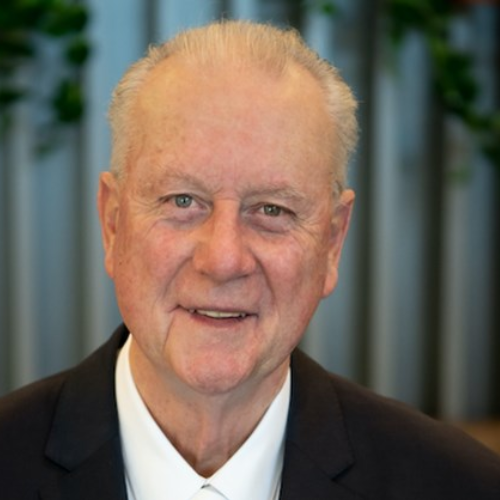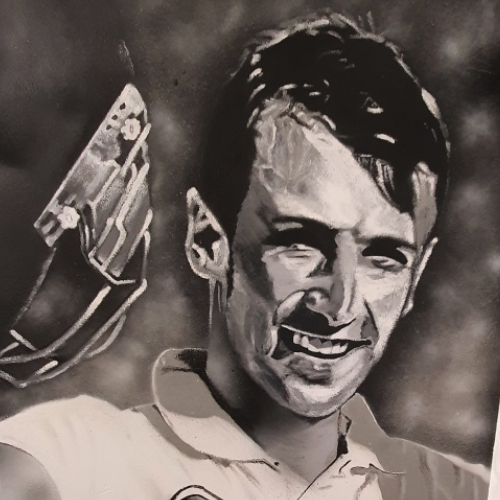Graham Manou is Australian Test Cricketer No 411 and played one Test on the 2009 Ashes Tour of England. As a wicket keeper he took 3 catches and scored 8 and 13 not out in the drawn third Test.
He also played 4 One Day Internationals for Australia.
Graham played 103 first-class games for South Australia taking 349 dismissals including 328 catches and 21 stumpings. He scored 4,003 runs at an average of 25.49 and scored 6 hundreds and 20 half-centuries. His highest score was 190.
He played 118 one day games taking 152 catches and 16 stumping’s as well as playing 41 T20 games.
Graham played the majority of his Grade Cricket in Adelaide and is now employed by Cricket Australia as National Talent and Pathway Manager.
Let’s find out more about Graham’s cricketing journey and his role with Cricket Australia.
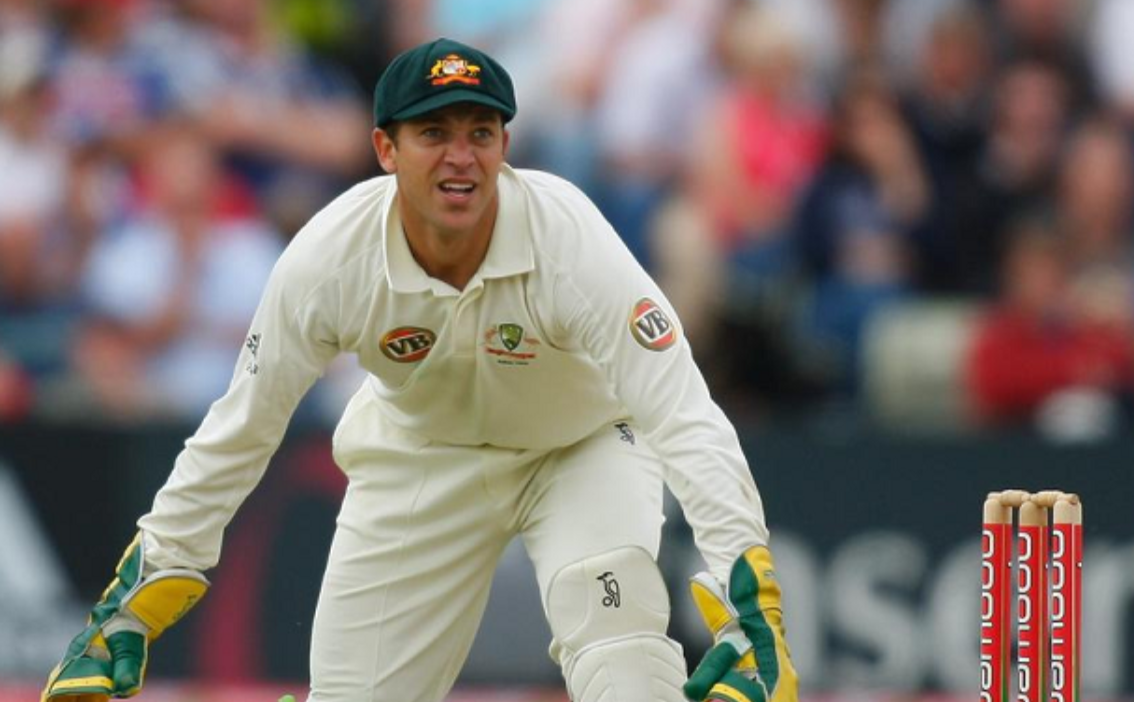
What year were you born?
1979
Where did you go the high school?
Para Hills High School in Adelaide
Do you remember your first ever game of cricket?
Vaguely. From what I can recall, it was for my primary school and like many with older siblings, I played in my brothers’ team as they were short on numbers. From memory, I batted for a few overs at the end of the allotted 25 overs and bowled a few overs with little success.
Where did you play your junior cricket?
Other than playing for my primary school, all my junior cricket was played for Salisbury District Cricket Club (now known as Northern Districts CC) in the SACA Underage competitions.
Which clubs have you played for?
I played for Northern Districts Cricket Club (formerly Salisbury District Cricket Club) is South Australia. I had a season with Monash Tigers (formerly Richmond Cricket Club in Victoria) when I moved to Victoria.
When did you first start wicket keeping – can you remember the circumstances in which you first picked the gloves?
It wasn’t long after my first game of cricket with my brothers’ side. I was about 10 years of age at the time and I saw it as a chance to get a game as I enjoyed playing with and against the older guys. I fell in love with it instantly. I enjoyed the fact that you were involved in every ball.
How old were you when you first played grade cricket, what grade and for which club?
I was fortunate as a 14-and-a-half-year-old to be identified by Wayne Bradbrook (all-time leading run-scorer in SA Premier Cricket) as someone who could handle playing up. Wayne was the club coach at the time. I played fourth grade for Salisbury District Cricket Club (now Northern Districts).
What were your cricketing ambitions?
Like most, I always dreamed of playing for Australia. Though as a kid I thought it was going to be as a fast bowler.
What age did you make your first-grade debut?
I was 16 and a half. I remember getting the call first thing on Saturday morning before the game to say Mark Sorell (who was a great wicketkeeping mentor of mine) had to pull out due to injury. We played University and I can remember it being a great education and quite a fiery contest. Safe to say my vocabulary expanded after the two days.
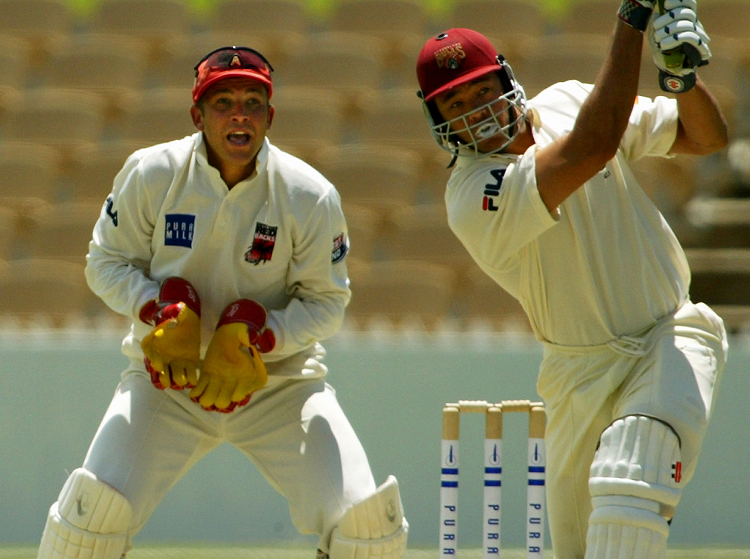
Graham Manou keeping for South Australia against Queensland
Who were the best 3 bowlers you kept to in Grade Cricket?
Shane George and Ryan Harris for obvious reasons. Both had wonderful actions and an amazing ability to generate swing at a great pace. Both two of the most competitive bowlers I have ever had the pleasure to play with.
Steven Busbridge was the other bowler. As a youngster, he represented Australia at the U19 World Cup in South Africa. A bad back injury meant he didn’t quite regain the pace he once had but was one of the more skilful and selfless players I played with.
Who would you consider the best 3 bowlers you kept to in First-Class cricket?
Jason Gillespie, Shaun Tait and Paul Rofe. All exceptional fast bowlers with different traits, but as a wicket keeper, you always felt in the game when they had the ball in their hands.
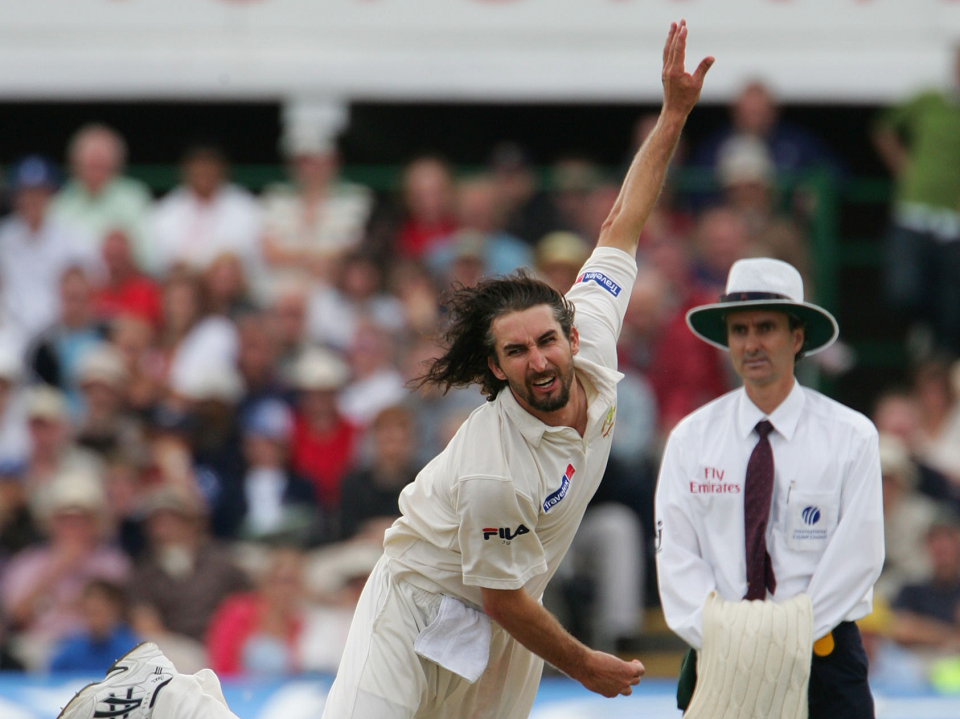
Jason Gillespie
Who were the keepers you admired most in First-Class cricket?
There is quite a list.
Goes without saying why Adam Gilchrist. What he was able to achieve, very few can say they changed the game and how it was played. He changed the expectations for a modern-day keeper.
Brad Haddin – always a tough competitor who like Gilly could change the game and was a match-winner.
Wade Seccombe and Chris Hartley – Both exceptional gloveman. Probably two of the fittest wicketkeepers I played against and two of the nicest men in cricket.
Darren Berry – Had arguably the best pair of hands I saw up close and personal. He was able to create wickets behind the stumps like very few in the history of the game could.
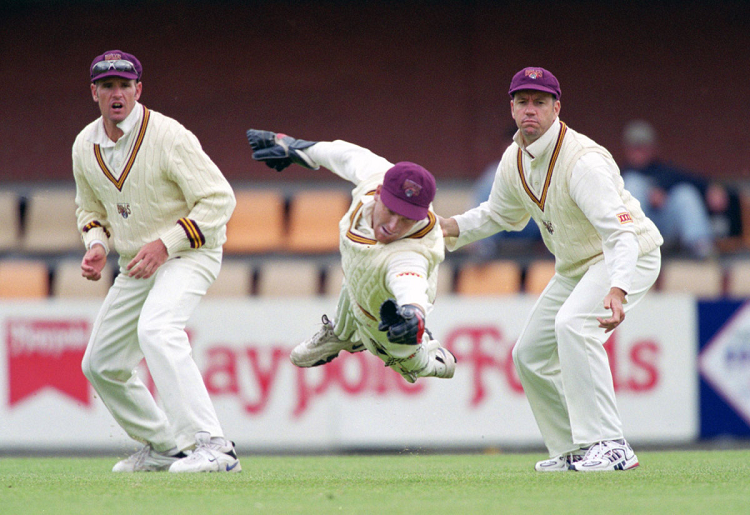
Wade Seccombe
Who were the three players you admired most in terms of skill and competitive spirit during your time playing Grade Cricket?
Anthony Heidrich – 2-time Bradman medalist born in the wrong era. Was the best all-rounder I played with and had he been playing now would be someone who would do extremely well in T20 cricket. One lasting memory was we lost the toss on a 40-degree day and were asked to bowl. He bowled the whole of the first session and at times was throwing up at the top of his mark. We bowled the opposition out before tea that day and he took 5 of those.
Andrew Eime – was a fantastic fast bowler for the Woodville District Cricket Club. He not only had pace, but he embodied the spirit of what playing for your club was about which meant as an opposition player you always knew you were in for a tough day. He was extremely unlucky not to have played more cricket for South Australia.
Brenton Opperman – by far and away the best fielder I have seen in my time in the game. He was also a wonderful batter and leader. Like Andrew, he was extremely passionate about Premier Cricket and was an integral part of one of the most successful era in the Salisbury/Northern District Cricket Club history.
When did you make your first-class debut for South Australia and what can you remember about the game?
1999 against Victoria in Adelaide. I remember we were in control for the first 3 days of the match. We declared our second innings 5 down and they needed around 290 on the 4th day to secure the 6 points. From ball one of their innings, not many missed the centre of Jason Arnberger and Matthew Elliott’s bats. They managed to chase the total down with the loss of just 1 wicket. Both Herb and Arnie scored great hundreds for the Vics and me as a young player it was a great lesson in how first-class cricket as played.
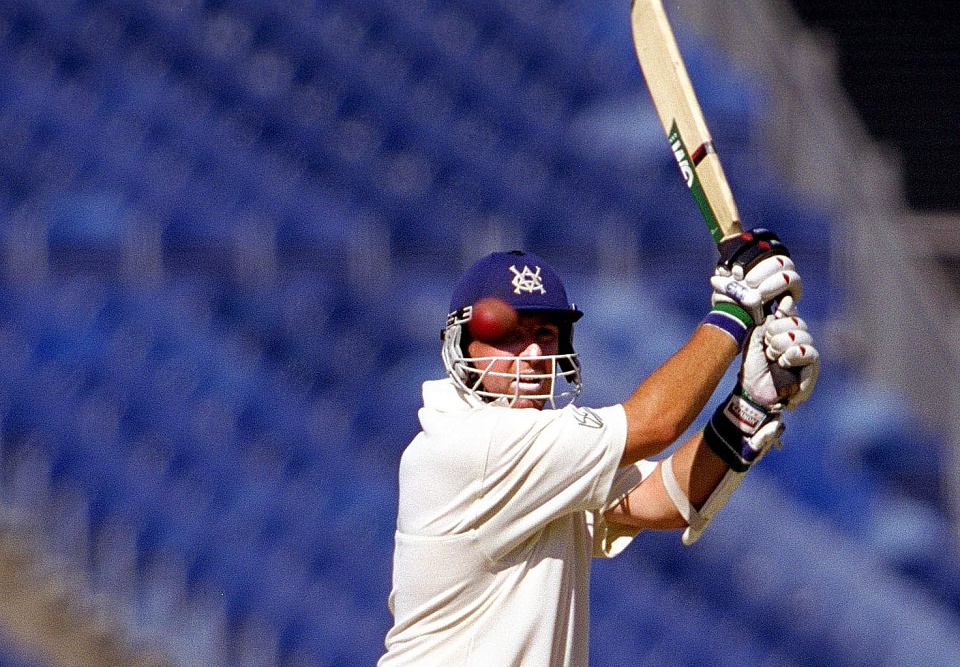
Jason Arnberger
What was your best performance with the gloves?
Tough question. Probably would have to say it would be my third first-class match. We played Western Australia at home in Adelaide on an old fourth day turner. We beat WA by 2 runs when they only needed around 190 to win. I was fortunate to be playing with Brad Young and Peter McIntyre who both represented Australia and bowled beautifully. I was able to take several dismissals that day in conditions that were relatively foreign to me as a young player. The most pleasing dismissal was the last. A stumping off Brad Young to dismiss Brad Oldroyd.
You made your Test debut for Australia in the 3rd Ashes test in England. How did you find out about your selection, who presented you with your baggy green and what can you remember most about your test debut?
I found out about a minute before Simon Katich and Shane Watson went out to bat. The day had been delayed by rain and when we finally we able to warm up, I went about my usual routine which was to ensure the 11 players were ready to play. Often, I would hit balls to Brad Haddin, and he would be done. On this day he stood behind the stumps to take a few from the quicks and the very last one clipped the stump and hit him on the end of the finger. I didn’t take much notice of things as he was a tough bugger and it wasn’t until I came into the rooms that there was a bit of commotion and Jamie Cox (selector on duty) and Steve Bernard (Team Manager) told me that I was playing. I didn’t receive my baggy green until the morning of day 2. Ricky Ponting presented me my cap which was an extremely humbling experience.
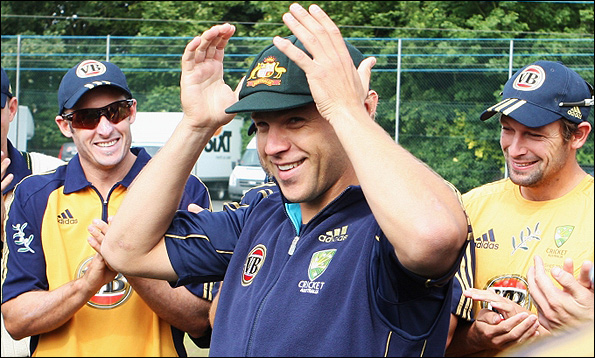
Graham and his Baggy Green
The thing I remember the most was by far the most enjoyable moment I had ever experienced walking out on to the ground for the first time. I guess as an older player I had developed a routine that I trusted and felt was able to perform at the top. It’s hard to explain the feeling of joy after all the hard work to get the opportunity, but at the same time, I felt horrible because a great mate and person I admired so much allowed me the chance to play due to him getting injured.
Unfortunately, in our second innings, I wore one on the knuckles from Stuart Broad and broke my hand. One of those things I guess that when you look back now you can laugh at, having worked hard to get the opportunity, the very thing that allowed you the chance was the thing that ensured I would only have the one opportunity at Test match level.
From one wicket keeper to the thousands of keepers who play each weekend can you describe the feeling when you took your first catch for Australia in Test cricket?
Relief! I remember being confident in my ability walking out to keep, but you can never be overconfident in English conditions as the ball does so much after it passes the bat, sometimes you do well to stop the ball. I’ll never forget Sids (Peter Siddle) saying to me that I will always remember him as he was the guy who bowled the ball that got me my first dismissal.

The celebration of Graham Manou first Test catch
What’s been your most memorable moment in cricket?
All my debuts, be it for my Premier Club, First Class and International. They are always special moments. It’s hard to split my most memorable moment between the first time I stepped on to the field to represent our country and our first premiership for Northern Districts Cricket Club in 2004/05.
Who’s been the biggest influence in your cricket career?
This is a hard question to answer as there have been a few and will probably miss a few out. Wayne Bradbrook, Russell Thompson, Darren Lehmann and Steven Busbridge all from my club (Salisbury/Northern Districts). All of them influenced how I played and respected the game.
Mark Sorell was by far the greatest influence on me as a wicketkeeper from a young age. He stepped aside for me to play first grade and is a great coach and sounding board to this day.
And finally, Kim Harris was the person who I would say had the greatest impact on my career and more broadly life outside of cricket. He is the most selfless man I have ever had the pleasure of meeting and the honour to call a friend.
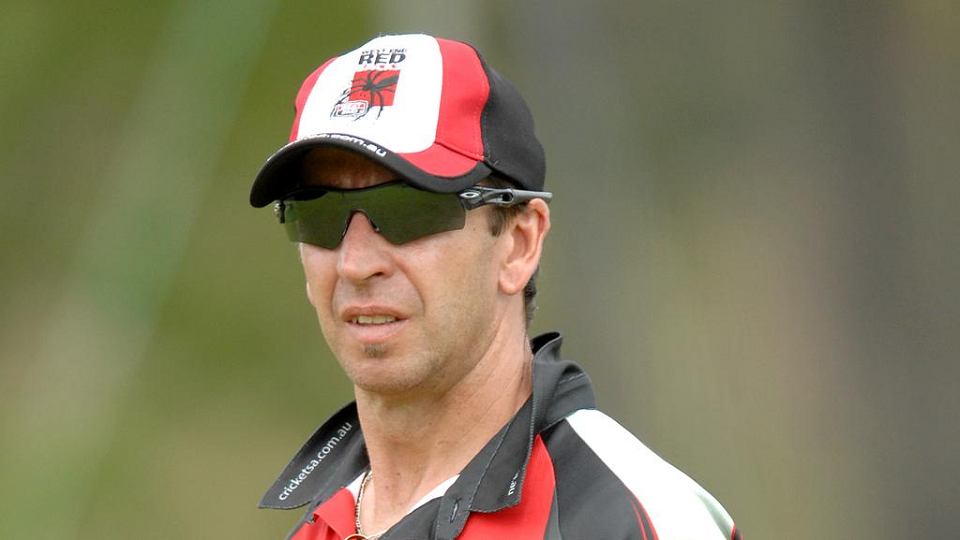
Mark Sorrell
Who was the funniest cricketing team mate?
Trent Kelly
Who was your most annoying team mate?
Mark Cosgrove – probably because most of us can only understand half of what he says
Who is your favourite all-time cricketer?
Ian Healy
If you’re in the middle seat of the middle row of Qantas QF1flight to London which team mates would you choose to on your left and right?
Ryan Harris and Dan Christian. Not sure I’d get a lot of sleep though.
Did you have any cricketing superstitions?
I was never a fan of other people trying on my wicket keeping gloves. I always thought it would be bad luck as generally, it would be the annoying fast bowlers who thought it would be funny to pretend, they could catch suddenly.
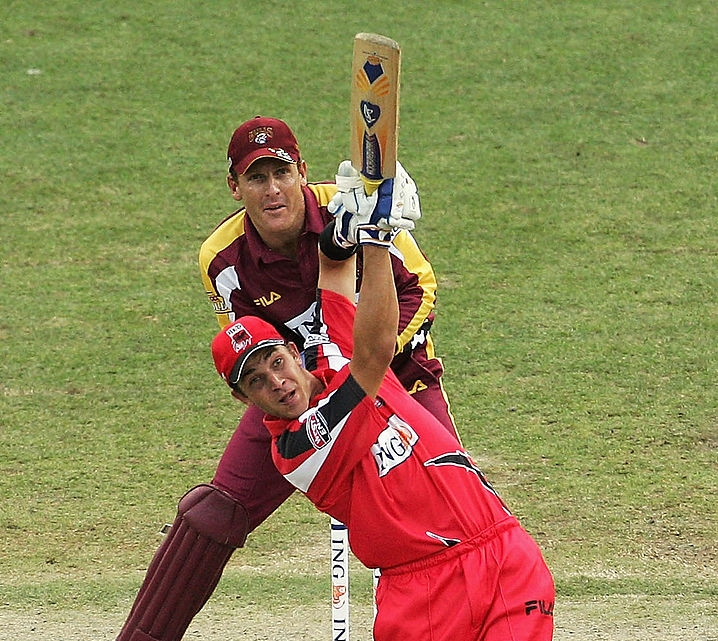
Graham Manou goes big in a one day game for South Australia
Favourite cricket ground?
Adelaide Oval
What’s the best advice you ever received?
To own your game. There are always going to be people offering advice on your game but at the end of the day there is only ever one person staring back at you in the mirror and you do not want to leave the game with any regrets.
You’re currently working for Cricket Australia as the National Talent and Pathway Manager. Are you able to share a little bit more about the role and its major objectives?
My role is to work with the State and Territory Associations to ensure we have a world-leading holistic development program in place for all young men that transverse across the ‘Pathway’ from the ages of 15 to 19. This includes but not limited to overseeing the Underage National Championships, Australian Youth Teams and programs.
We aim to ensure they each player is provided opportunities to develop and test their skills in a variety of ways. We understand that development is not linear so there need to be multiple entries and exit points along the way. Examples like the Underage National Championships allow for the players and coaches to understand where they are at in their cricket development and allow for them to work together to build long term development plans.
We place a high level of importance in ensuring all our programs offer the player opportunities where they can develop away from cricket. For example, even though our tours and programs are scheduled during school holidays, we will have a ‘tutor’ travel with teams at times where we feel it will benefit those in year 12 or studying at university.
Despite all of this and popular belief, it does not mean they get an armchair ride to the top. They still must earn the right to play for their Premier Club, State and hopefully Australia.
We hope that by the time all players exit the pathway they are better prepared to tackle the challenges cricket and life throws at them having had several different experiences and opportunities along the way.
What advice would you offer a young 18 year-old who has the ambition of playing test cricket?
Not to leave a stone unturned - Be responsible for your learning and development on and off the field.
Always ask yourself what the team needs me to do and not the other way around. It is a critical character trait that all teams want.
Ensure you always have balance in your life regardless of where your cricket takes you. You are a long time retired and to have a purpose outside of cricket will help you perform.
Respect the game and make sure that when you leave it, it is in a better place than when you found it.
Have fun!
What are your hobbies?
Riding my bike. Found this when I was captain of South Australia to be a great way to escape from the world and be in your thoughts for a few hours.
Golf and Fishing, though since having children it has been difficult to find too much time when I am at home and not travelling.
Reading. I am a huge history buff especially when it comes to learning about World War II.
Are there any lessons from your time in cricket that you take into work or life in general?
Absolutely. I have found there are many transferable skills and lessons from my time in the game that have assisted my work and life in general.
Probably the most beneficial has been learning to understand and deal with different types of personalities each with their set circumstances and motivations. This has helped me to develop an ability to have conversations across many layers.
For example, on any given day I could be talking to an 18-year-old about his cricket and where he can improve after missing out on a team we have selected and the very next conversation might be with a parent who is looking for advice as to how to deal with their sons battle with mental health to then talking to senior executives across Australian cricket about our programs and processes.
Join the cricket network to promote your business and expertise. Make it easy for people to search and find the people and services they need through people they know and trust.
Join the network
